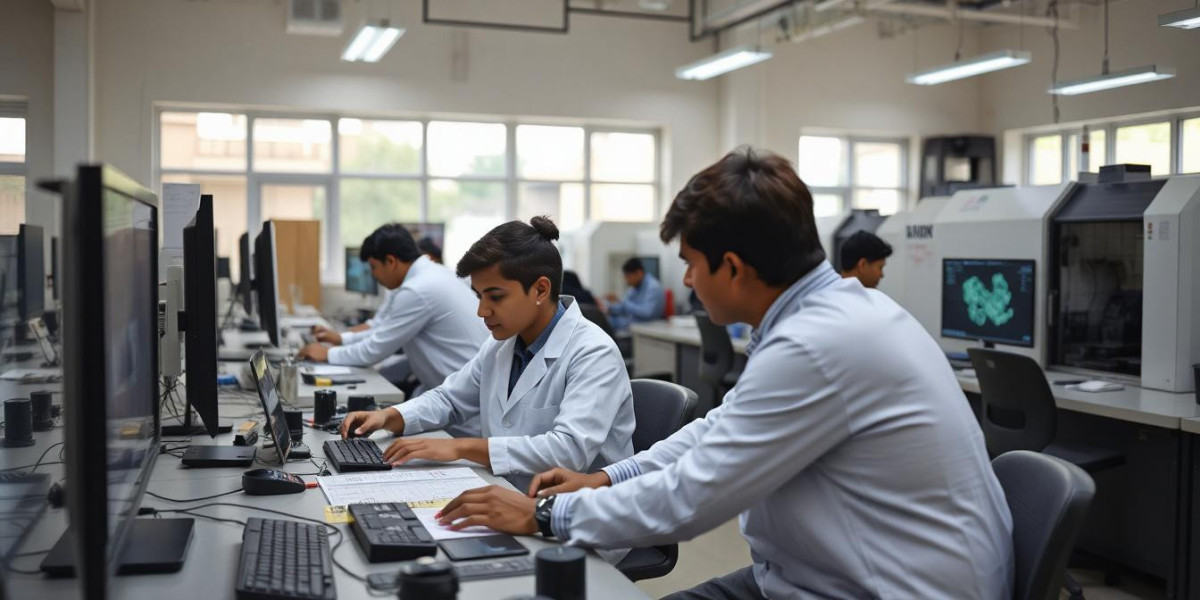Introduction
Choosing the right college for pursuing a B.Tech Mechanical Engineering in Lucknow is a crucial step that can shape your future career and personal growth. With numerous engineering colleges available in Lucknow, it can be overwhelming to identify the perfect institution that aligns with your goals, interests, and budget. This comprehensive guide by Dr. M.C. Saxena Group of Colleges (MCSGOC) will help you understand the key factors you must consider before making your decision.
This guide covers everything from infrastructure, faculty, course curriculum, placements, and extracurricular activities to help you choose the best college that offers quality education and a thriving campus environment.
1. Why Choose B.Tech Mechanical Engineering in Lucknow?
Lucknow, the capital city of Uttar Pradesh, is emerging as a hub for educational institutions, especially engineering colleges. Opting for a B.Tech in Mechanical Engineering in Lucknow offers several advantages:
Strategic Location: Lucknow connects with major cities in North India, making internships and industry exposure easier.
Growing Industrial Sector: Proximity to industries provides practical exposure and better job opportunities.
Affordable Education: Compared to metropolitan cities, engineering education in Lucknow is often more affordable without compromising quality.
Cultural and Academic Environment: Lucknow blends traditional values with modern education, fostering holistic development.
2. Understanding B.Tech Mechanical Engineering: Course Overview
Before diving into college selection, understanding what B.Tech Mechanical Engineering entails is essential. This branch focuses on the design, manufacturing, and maintenance of mechanical systems. It combines principles of physics, material science, and engineering to develop efficient mechanical solutions.
Key subjects typically include:
Thermodynamics
Mechanics of Materials
Fluid Mechanics
Manufacturing Technology
Robotics and Automation
CAD/CAM (Computer-Aided Design and Manufacturing)
3. Factors to Consider When Choosing the Right B.Tech Mechanical Engineering College in Lucknow
3.1 Accreditation and Affiliation
When selecting a college for your B.Tech Mechanical Engineering in Lucknow, accreditation is not just a formality—it reflects the quality and credibility of the institution. The All India Council for Technical Education (AICTE) is the statutory body responsible for approving technical institutions across India. Choosing an AICTE-approved college means that the curriculum, faculty qualifications, infrastructure, and student facilities have met the standards laid down by this apex body.
Furthermore, the college's affiliation with a reputed university is equally important. Affiliation ensures that the degree awarded is recognized nationally and internationally. Universities such as Dr. A.P.J. Abdul Kalam Technical University (AKTU), Lucknow University, and others are known for maintaining high academic standards. Verify the college's official affiliation certificates to avoid unrecognized institutions.
3.2 Faculty Expertise and Student-Faculty Ratio
The quality of faculty plays a pivotal role in shaping the engineering skills of students. Experienced professors with industry exposure bring practical insights that go beyond textbooks. Look for faculty members who have published research papers, worked on industry projects, or contributed to engineering innovations.
The student-faculty ratio is another crucial metric. A lower ratio ensures personalized attention, mentorship, and effective doubt clearance, leading to better academic performance.
3.3 Infrastructure and Facilities
Mechanical engineering is a practical field requiring hands-on training. Modern laboratories equipped with the latest machinery for thermodynamics, fluid mechanics, material testing, and CAD/CAM software labs are essential. Workshops with real-world manufacturing tools help students grasp machining, welding, casting, and other manufacturing processes.
Additionally, access to digital libraries, research centers, and computing facilities fosters innovation and self-learning. MCSGOC, for instance, invests significantly in keeping its infrastructure state-of-the-art to meet evolving industry demands.
3.4 Curriculum and Industry Relevance
The field of mechanical engineering is rapidly evolving with advancements in automation, robotics, and sustainable energy solutions. Therefore, a stagnant curriculum that doesn’t incorporate recent developments can leave students unprepared.
Prefer colleges that update their syllabus regularly by consulting industry experts and academicians. Look for programs that integrate emerging subjects such as mechatronics, renewable energy technologies, and computer-aided manufacturing.
Additionally, the inclusion of project-based learning, industrial training, and seminars enhances practical knowledge and soft skills.
3.5 Industry Exposure and Internships
Theory alone does not make a competent engineer. Industrial exposure through internships, live projects, and collaborations is vital. Colleges with established industry networks offer students internship opportunities that provide real-world challenges, problem-solving skills, and networking.
These internships often turn into pre-placement offers, giving students an edge in the competitive job market. Check if the college organizes industrial visits, guest lectures by industry leaders, and workshops to keep students connected with the corporate world.
3.6 Placement Records and Career Support
A good placement record reflects the college’s reputation and the trust companies place in its graduates. Analyze the average and highest salary packages offered, the variety of recruiting companies, and the percentage of placed students in recent years.
Also, check if the college has a dedicated training and placement cell that prepares students with resume writing, interview skills, aptitude tests, and career counseling. Some colleges conduct mock interviews and technical workshops to improve employability.
3.7 Campus Life and Holistic Development
Education is not just academics. Participating in clubs, sports, technical competitions, and cultural events builds teamwork, leadership, and creativity. Colleges with active student chapters of professional bodies like SAE (Society of Automotive Engineers) and ISTE (Indian Society for Technical Education) provide platforms for innovation and competitions.
Extracurricular engagement also reduces stress and promotes overall well-being.
3.8 Location, Accessibility, and Safety
The college location affects daily commute time and cost. Consider colleges in well-connected areas of Lucknow with access to public transport. Additionally, ensure the campus has proper security arrangements, especially for female students.
Hostel facilities with good hygiene, food, and recreational amenities are also important for outstation students.
3.9 Fee Structure, Scholarships, and Financial Aid
Engineering education is a significant investment. Compare tuition fees, hostel charges, and additional costs among shortlisted colleges. Many reputed institutions offer scholarships based on merit, sports achievements, or economic background.
Explore government scholarships like the Central Sector Scheme and state scholarships, as well as private funding options.
Expanded Section 4: Why Dr. M.C. Saxena Group of Colleges (MCSGOC) is a Preferred Choice for B.Tech Mechanical Engineering in Lucknow
Dr. M.C. Saxena Group of Colleges (MCSGOC) has earned a stellar reputation as one of the premier engineering institutes in Lucknow. Here’s a deeper look into what makes MCSGOC stand out:
Academic Excellence: MCSGOC ensures rigorous academic training through a curriculum designed in line with AICTE guidelines and industry needs. The syllabus is continuously updated to integrate cutting-edge technologies like Industry 4.0, robotics, and renewable energy.
Highly Qualified Faculty: The college boasts a team of dedicated professors and visiting faculty with doctoral degrees and rich experience. Faculty members are actively engaged in research, publications, and industry projects, contributing to a vibrant learning atmosphere.
World-Class Infrastructure: The college campus houses advanced laboratories with equipment from leading manufacturers. Sophisticated CAD/CAM labs, 3D printing facilities, and robotics workshops prepare students for real-world challenges.
Strong Industry Linkages: MCSGOC has forged partnerships with major engineering firms and automotive companies in and around Lucknow. These collaborations facilitate internships, guest lectures, live projects, and campus placements.
Comprehensive Placement Support: The dedicated training and placement cell at MCSGOC conducts career development programs, soft skill training, and mock interviews. Their consistent efforts have resulted in a placement rate exceeding 90% for mechanical engineering graduates.
Vibrant Campus Life: The college promotes all-round development through technical clubs, sports teams, cultural festivals, and innovation challenges. Events like annual tech fests and robotics competitions encourage creativity and teamwork.
Affordable Education and Scholarships: MCSGOC offers competitive fee structures along with scholarships for meritorious and economically disadvantaged students, making quality education accessible.
Expanded Section 5: Steps to Select the Right B.Tech Mechanical Engineering College in Lucknow
Selecting a college can be daunting. Here is a detailed step-by-step guide to help streamline your decision-making:
Step 1: Research and Shortlist Colleges
Start with a broad search using trusted education portals, official college websites, and reviews. Make a list of colleges offering B.Tech Mechanical Engineering in Lucknow, focusing on accreditation, faculty, and placement records.
Step 2: Attend Education Fairs and Counseling Sessions
Participate in career fairs and college counseling sessions conducted by coaching institutes or educational bodies. These provide direct interaction with college representatives and current students.
Step 3: Visit Campuses Personally
Nothing beats a personal visit. Observe the campus infrastructure, cleanliness, student behavior, and faculty engagement. Talk to current students and professors to get insider insights about academics and campus life.
Step 4: Evaluate the Curriculum and Academic Environment
Request detailed syllabus and course structure brochures. Analyze how balanced the curriculum is between theory, practicals, projects, and internships. Look for opportunities to learn emerging technologies and interdisciplinary subjects.
Step 5: Review Placement Data and Industry Connections
Ask for the latest placement report specifying recruiters, packages, and roles offered. Attend campus placement drives if possible to understand the level of company participation.
Step 6: Compare Fee Structure and Financial Assistance
Prepare a comparative table including tuition fees, hostel fees, exam fees, and other expenses. Contact the college administration to inquire about scholarship eligibility and application procedures.
Step 7: Assess Extra-Academic Facilities
Check availability of sports complexes, auditoriums, seminar halls, student clubs, and health services. These contribute significantly to a balanced college experience.
Step 8: Make a Final List and Apply
Narrow down to 2-3 colleges based on all the above factors. Apply to your preferred colleges and prepare for entrance exams or counseling sessions.
6. Frequently Asked Questions (FAQs)
Q1: Why is AICTE approval important for a B.Tech Mechanical Engineering college?
Answer:
AICTE (All India Council for Technical Education) is the regulatory authority for technical education in India. AICTE approval ensures that the college follows minimum standards in terms of faculty, infrastructure, curriculum, and student facilities. Without this approval, degrees awarded may not be recognized by government bodies or employers.
Example:
A student who graduates from an AICTE-approved college will be eligible for higher studies such as M.Tech, government jobs, or PSU recruitments. Conversely, a degree from an unapproved institution might lead to difficulties in these areas.
Q2: How does faculty experience impact my engineering education?
Answer:
Experienced faculty can provide deeper theoretical knowledge as well as real-world insights from their industry exposure. They are also better equipped to mentor students, guide research projects, and connect students to industry networks.
Example:
At MCSGOC, faculty members have previously worked in automotive and manufacturing firms. Their practical knowledge enhances classroom teaching, giving students a competitive edge during internships and placements.
Q3: What kind of infrastructure should I look for in a Mechanical Engineering college?
Answer:
Look for well-equipped mechanical labs such as:
Thermodynamics Lab with boilers and heat engines
Fluid Mechanics Lab with flow measurement devices
Material Testing Lab for tensile and compression testing
CAD/CAM Lab with latest design software like AutoCAD, SolidWorks
Workshops with machinery for welding, casting, and machining
Example:
During an industrial visit arranged by MCSGOC, students got hands-on experience with CNC machines, which is crucial for understanding modern manufacturing processes.
Q4: Are internships necessary during a B.Tech Mechanical Engineering course?
Answer:
Yes, internships are vital for gaining practical exposure, applying classroom knowledge, and understanding industry work culture. They improve employability and often lead to job offers.
Example:
A student interning at a Lucknow-based automotive company through MCSGOC's industry tie-up was offered a pre-placement after demonstrating skills on a live project.
Q5: What is the typical placement scenario for Mechanical Engineering graduates in Lucknow?
Answer:
Placement opportunities vary by college and industry trends but typically include roles in manufacturing, automotive, design, maintenance, and research & development. Average packages can range from INR 3 to 6 lakhs per annum for fresh graduates.
Example:
MCSGOC has consistently maintained a 90%+ placement rate, with recruiters like Tata Motors, Bajaj Auto, and L&T offering roles in design engineering, quality control, and production management.
Q6: How often is the curriculum updated to match industry demands?
Answer:
Top colleges revise their curriculum every 2-3 years by consulting industry experts and academia. This includes introducing emerging topics like Industry 4.0, robotics, renewable energy, and IoT applications.
Example:
MCSGOC recently introduced courses on automation and robotics in collaboration with local industries to ensure students stay updated with current technology.
Q7: What extracurricular activities benefit a Mechanical Engineering student?
Answer:
Participating in robotics clubs, SAE collegiate clubs, technical fests, and sports enhances teamwork, leadership, and problem-solving skills, which are highly valued by employers.
Example:
MCSGOC’s SAE club won a national-level automotive design competition, showcasing the practical application of classroom learning and teamwork.
Q8: Is campus location important for engineering students?
Answer:
Yes, a well-connected location reduces commute time and stress, enabling students to focus on academics and activities. Additionally, proximity to industrial hubs can enhance internship and job opportunities.
Example:
MCSGOC’s campus in Lucknow is easily accessible via public transport and is close to several manufacturing industries, facilitating industrial visits and internships.
Q9: What scholarships are available for mechanical engineering students?
Answer:
Scholarships may be offered based on merit (academic performance), sports achievements, or financial need. Government schemes and private foundations also provide funding.
Example:
MCSGOC offers merit-based scholarships to top-performing students each semester, along with guidance on applying for state and central government scholarships.
Q10: Can I switch specializations or pursue higher studies after B.Tech?
Answer:
While most students continue in Mechanical Engineering, you can pursue specializations like robotics, automotive design, or thermal engineering at the postgraduate level. Additionally, many mechanical engineers opt for MBA or research programs.
Example:
An MCSGOC alumnus pursued M.Tech in Thermal Engineering from IIT Kanpur and now works on renewable energy projects.
Q11: How do college placements handle students with lower academic scores?
Answer:
Colleges often conduct soft skill and technical training sessions to improve employability regardless of academic scores. Some companies also focus on aptitude and practical skills over marks.
Example:
MCSGOC’s placement cell organizes intensive workshops and mock interviews, helping students with average grades secure internships and jobs through improved communication and technical skills.
Q12: What is the importance of student reviews and alumni feedback?
Answer:
Reviews from current students and alumni provide realistic insights into college culture, teaching quality, and placement support, helping prospective students make informed decisions.
Example:
Positive alumni testimonials from MCSGOC highlighted the supportive faculty and robust placement assistance, influencing many new admissions.
Q13: How can I assess the return on investment (ROI) for an engineering college?
Answer:
Calculate ROI by comparing total costs (fees, living expenses) against average placement packages and career growth opportunities post-graduation.
Example:
Though some colleges charge higher fees, MCSGOC’s excellent placement record and scholarships make it a cost-effective choice with a high ROI.
Q14: Is it beneficial to join student professional bodies during college?
Answer:
Yes, professional bodies like SAE, ISTE, or ASME offer workshops, conferences, and networking opportunities that enrich learning and increase employability.
Example:
MCSGOC encourages students to join these societies, and many have presented research papers at national engineering conferences.
Q15: What role do technical fests and competitions play in engineering education?
Answer:
They foster innovation, teamwork, and application of theoretical knowledge. Participation in such events also boosts resumes and confidence.
Example:
The annual “MechTech Fest” at MCSGOC attracts industry experts and gives students a platform to showcase their projects and inventions.








